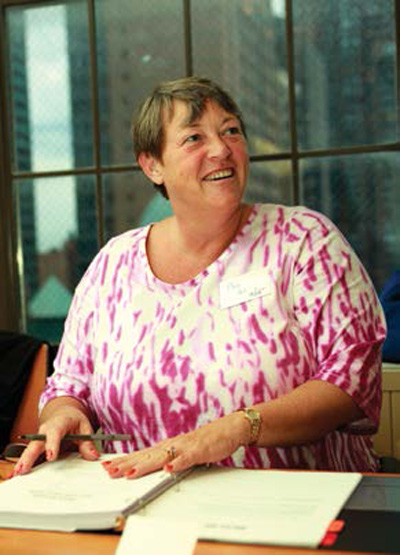Affordable College Tuition
October 30, 2015

CREDIT CARDS & MORTGAGES TO PAY FOR COLLEGE
When Peggy Wineski, a lab clerk at Montefiore New Rochelle in New York State’s Westchester County, decided to go back to college 10 years ago, she didn’t know her diploma would come with a second mortgage.
Wineski, who’d been laid off from her job as a bank loan officer, completed her Bachelors of Science majoring in nutrition at Lehman College in the Bronx. She then went on to earn a Master’s Degree in Health Education and Promotion at Lehman. She paid roughly $38,000 out of her own pocket for each of her degrees.
“When I graduated with my Bachelor’s we took out a home equity loan to pay off the credit cards I used to pay for everything while I was in school,” she says. “And then when I decided to go for my Master’s, we had to re-apply for another home equity loan to cover the original loan.”
Wineski, 56, was spending as much as an additional $500 a semester on books. Her husband took as much overtime as he could at his job at Pathmark supermarkets to help cover some fees and pay down the home equity loans while she was in school, but it was still a stretch.
“I know I’m very lucky because we had the house to fall back on. It’s a horror for a lot of people. You’re told you make too much money and you can’t qualify for aid or grants and then you have to borrow private student loans; those interest rates are astronomical,” she says. “Universities have money, but the only people who get it are the super-rich or the very, very poor. The working class needs help, too. We need to pressure the people who give universities their endowments to look at the money and make sure they know where it’s going.”
The current job market doesn’t help students either, she says. She became a lab clerk at Montefiore New Rochelle because she wanted to be in health care but couldn’t find a position in her specialty, health education. She likes the lab, she says, but is disappointed she can’t follow her passion.
“It would be nice if you could get a job in your field. You’ve studied. You’ve worked hard, but there just aren’t enough jobs out there for people,” she says, the frustration rising in her voice.
“People have Master’s Degrees and Ph.D.’s, and they can’t use them. They’ve spent $100,000 and they’re working in McDonald’s. It depresses you and makes you think, ‘Why am I even bothering?’”

“THESE DAYS YOU NEED TO BE RICH TO GO TO COLLEGE”
Susan Clark is a CNA at Future Care Cold Springs in Baltimore, MD. Her son Sidney Elliott, 19, wants to be an engineer. Clark says he’s a good enough athlete that he might have been able to get through school that way, but he wanted to focus on academics. Sidney, her youngest, just finished his sophomore year at West Virgina University and when Clark is asked about the costs of sending her son to school she takes a deep breath.
“Wow. It’s not easy. I don’t even have the words for it sometimes,” she says. “But our kid deserves the best, and we make it work.”
Clark and her husband, a Verizon worker, have eight kids. The cost of West Virginia is over $40,000 a year. Sidney takes about $15,000 in loans and the family qualifies for grants and other financial aid, but that still leaves a big chunk of money to be covered for housing, books and everyday expenses.
“When it comes time to pay the tuition I work a whole lot of doubles,” she says. “You do what you have to do.”
Clark’s more concerned about her son’s future than the hard work it takes to pay his tuition.
“He tells me not to worry because when he graduates he’s going to get a good job and pay back his loans. He tells me that we’ll worry about it when the time comes,” she says.
The point is that no one should have to worry or work double after double, says Clark.
“They need to lower tuition at these colleges. A lot of people, especially Black people, don’t have the money for it,” she says. “It’s why I push my own kids to go to school: so they don’t have to go through what we go through—working so hard. These days you need to be rich just to go to college, and I don’t think that’s fair.”
“EDUCATION IS THE KEY RIGHT NOW”
Like a lot of parents Lisa King, a certified pharmacy tech at Morton Hospital in Taunton, MA, and her husband, a UPS driver, put money away for their kids’ college education. With a 10-year old and a six-year-old, college is a while off, but the Kings still think about it.
“I work with pharmacists and some of them are carrying hundreds of thousands of dollars in loans,” says King, referring to the future she’s hoping to help her kids avoid.
“I one hundred percent agree with what the president is saying right now [about reforming student loan lending practices]. Sallie Mae should have to give thousands of dollars back to people,” she says.
King is an active 1199SEIU delegate and graduate of the Union’s Leaders in Training and Advanced Leaders in Training Programs. King’s also a U.S. Army veteran who started her education under the GI Bill. She’s passionate when she talks about education and the need to make it available and affordable for working people.
“I look at our Training and Upgrading Fund, and it’s one of the things I value the most,” she says. “Education is the key right now”
“When my kids ask me why I have to go to Boston I tell them it’s because I have to go and fight for the union.

